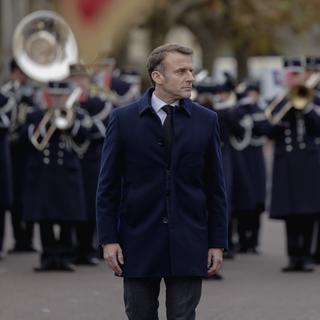


The slow twilight of Emmanuel Macron
Long ReadSeeing his influence decline after his decision to dissolve the Assemblée Nationale on June 9, which led him to appoint a prime minister without a majority and over whom he has no control, the French president has lost track of his second mandate.
He knows his songs by heart. In the corridors of the Elysée Palace, it's not unusual to hear him warm up his voice to one of his tunes before a speech. On Tuesday, October 15, Emmanuel Macron was in front of his idol, moved like a child. The French president presented singer Michel Sardou with the insignia of grand officer of the national order of merit. In the Salon des Ambassadeurs, a small circle of friends and family gathered around the 77-year-old, who had just completed his farewell tour. There were eight guests, including the presidential couple, actor Jean-Paul Rouve and the president's adviser on historical issues, former journalist Bruno Roger-Petit, who made a documentary on Sardou in 1998.
"What you're expressing are not your personal thoughts, they're those of an eternal Frenchman," Macron told the artist who had been singing "le temps béni des colonies" ("the blessed days of the colonies") and "j'ai envie de violer les femmes, de les forcer à m'admirer" ("I want to rape women, force them to admire me") since the 1970s.
Once again, the president had chosen to ignore the indignation of feminist activists, who have accused the singer of conveying racist and sexist clichés. But in the Elysée's little boys' club, Sardou, described as a "Houellebecquian character," is revered. The president continued as if talking about himself: "You grasp France in its totality, with its contradictions, you accompany our lives in all their complexity. You defy all labels, all right-left affiliations, you who lends your voice to the silent majority."
A popular singer bids farewell and a discredited president sees the end approaching – an unusual display six months after the failed dissolution of the Assemblée Nationale. Yet, that evening, in the half-empty palace, there was a rare sense of ease, far from the hubbub of the political crisis tormenting the country. Macron delighted in the anecdotes told by "Michel," who, glass in hand, recounted his first performance at the Olympia concert venue in Paris. Did the president remember, in that moment, that his friend and former Renaissance MP Patrick Vignal – who was swept away by the dissolution – had described him this summer as "an artist gone out of fashion"? "That was stupid, your sentence. Get someone to refute it," the president swiftly retorted.
The wound of dissolution
Since the disastrous dissolution, which saw him lose around a hundred MPs, Macron has grown weary of criticism, feeling he has addressed it countless times. Yet, he's still surprised by the lack of understanding. "Who are you talking about?" he said when a friend brought up the reproaches of an elected member of his Renaissance party. "I'm interested in the names because I've already dealt with around 40 MPs and I think I've flipped everyone quite nicely," he wrote to his interlocutor, convinced that inviting MPs to lunch in small groups, as he's been doing since the summer, is enough to win them back.
You have 86.37% of this article left to read. The rest is for subscribers only.
